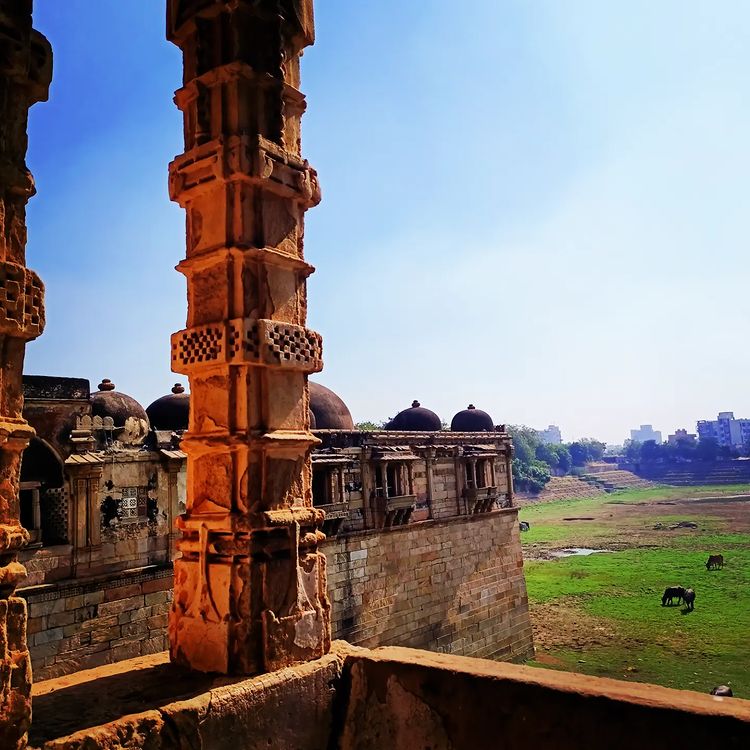Sarkhej Roza, Ahmedabad

Sarkhej Roza
Located 8 km southwest of the ancient center of Makarba, Sarhej Roza is a complex of mosques, tombs and palaces dedicated to the memory of Ahmed Hattu Ganj Baksh, spiritual adviser to Ahmed Shah I. Ruined and elegant buildings are clustered around a large tank built in the mid-15th century by Sultan Mahmud Begada (grandson of the Shah). It is an atmospheric place that has been used as a retreat by several rulers of Ahmedabad. The mausoleums of Mahmud Begada (located at the entrance, with geometric jalis casting light patterns on the floor) and his Ganj Baksh (largest in Gujarat) are both here. The place has a happy community vibe with locals picnicking in the large courtyard.
Read MoreHistory of Sarkhej Roza
Sheikh Ahmed Hattu Ganj Bakhsh was a friend and advisor to Ahmad Shah I, ruler of the Sultanate of Gujarat from 1411 until his death in 1442. Muhammad Shah II, successor to Ahmed Shah I, commissioned the Tomb of Sheikh Bahsh, completed in 1451. The next Sultan, Mahmud Vegada, expanded the complex by building Sarhej Lake around the tomb. He ordered a mausoleum to be built for himself and his family, directly across from Ganj Baksh’s tomb. His son Muzaffar Shah II and his wife Rajbai are buried here.
At some point in the 15th century, Sarhej was a village populated by Hindu weavers and indigo dyers under the rule of Sultan Ahmed Shah. Sultan Ahmed Shah is a descendant of the Muzaffari dynasty that founded Ahmedabad. Sheikh Ahmed Katu Ganj Bakhsh from Delhi settled in this village and became a revered Sufi saint in the country. He was also a dear friend of the ruler Shah, and when Hattu died around 1445, the Sultan ordered a mosque and mausoleum built in his memory. However, the monument was completed under the reign of his successor Sultan Qutub al-Din Ahmed Shah. These will be the first in a series of monuments that provoke a syncretism between the spiritual, royal and social realms of Sarhej.
Exploring the Serenity of Sarkhej Roza, Ahmedabad
Nestled in the vibrant city of Ahmedabad, Sarkhej Roza is a spectacular architectural marvel that seamlessly blends history, spirituality, and tranquility. If you’re planning a trip to Gujarat, this tranquil oasis should be at the top of your itinerary.
A Glimpse into History
Sarkhej Roza dates back to the 15th century and was built as a burial place for the revered Sufi saint, Shaikh Ahmed Khattu Ganj Baksh. This site showcases the rich cultural heritage of the region and reflects the fusion of Islamic and Indian architectural styles. As you stroll through the serene grounds, you can sense the spiritual energy that has attracted visitors for centuries.
The Architecture
One of the most striking features of Sarkhej Roza is its intricate architectural designs. The complex comprises of tombs, mosques, and a beautiful garden, all adorned with exquisite carvings. The main tomb, known for its stunning arches and intricately designed ceilings, is a visual delight. Don’t forget to capture some photographs of the stunning minarets that rise gracefully against the blue sky.
A Place of Peace and Reflection
What makes Sarkhej Roza truly special is the sense of peace that permeates the area. The lush gardens provide a perfect spot for meditation or quiet reflection. As you wander through the pathways lined with trees, you’ll find yourself transported far from the hustle and bustle of city life. It’s an ideal place for those seeking solace or inspiration.
Tips for Visiting
When planning your visit to Sarkhej Roza, here are a few tips to keep in mind:
- Best Time to Visit: The early morning or late afternoon is the perfect time to enjoy cooler temperatures and stunning sunlight for your photos.
- Dress Modestly: Since this site holds spiritual significance, it’s advisable to dress modestly and respect the local customs.
- Guided Tours: Consider joining a guided tour to learn more about the rich history and fascinating stories behind this beautiful site.
Conclusion
Sarkhej Roza stands as a testament to the grandeur of Ahmedabad’s history and culture. Whether you’re an architecture enthusiast, a history buff, or simply looking for a peaceful place to unwind, this stunning complex offers something for everyone. Don’t miss the opportunity to immerse yourself in the serene beauty of Sarkhej Roza during your visit to Ahmedabad.
For more information about travel guides and tips, visit tourmyodisaha.com. Happy travels!
Explore Ahmedabad, Gujarat
Explore Gujarat